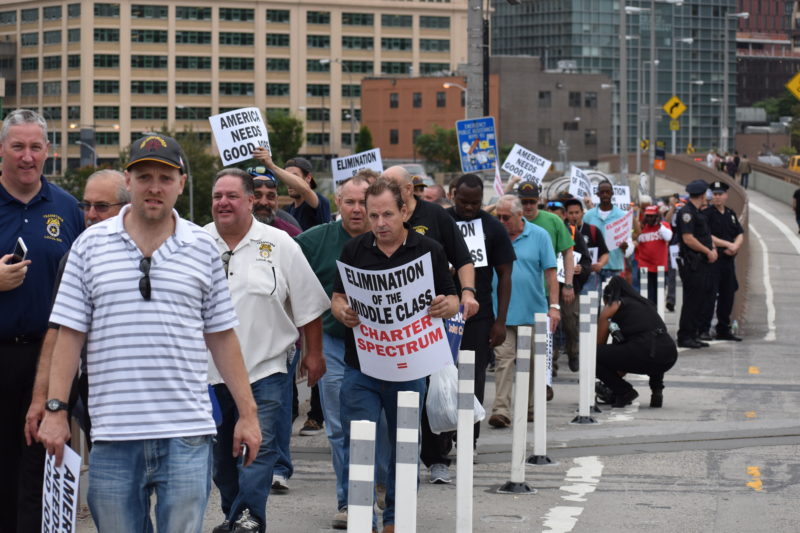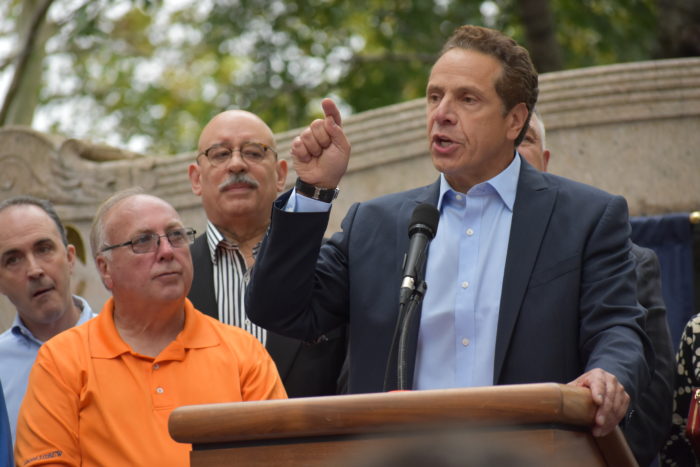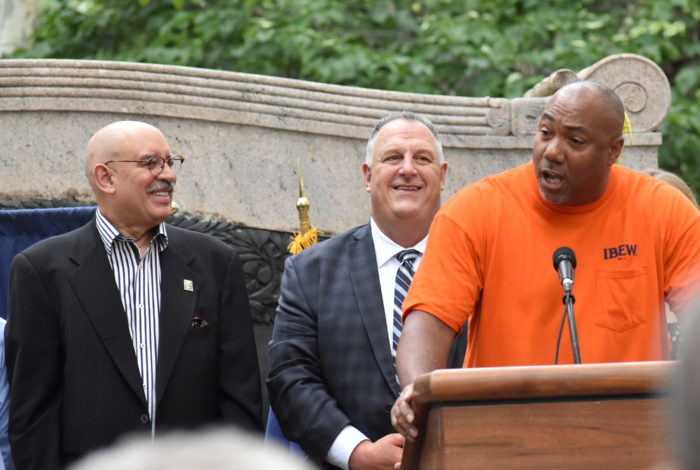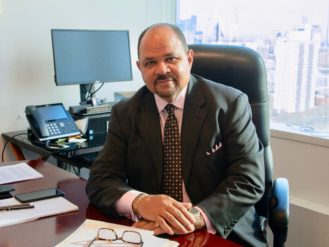A Cable Workers Strike Grows Increasingly Bitter
Out of work for six months, Spectrum strikers rally in Brooklyn to raise their profile and put pressure on the company to settle
Spectrum workers and their supporters rallied in Brooklyn, then marched across the Brooklyn Bridge to a second rally in Manhattan's Foley Square (Photos by Steve Koepp)
Ken Brome has been a cable guy for most of his life, starting three decades ago, when he was 22. He’s a survivor, enduring cancer and multiple changes in the company he works for, Charter Communications. But now he’s angry and worried because he has been on strike for six months. Brome rallied with hundreds of fellow union members and their supporters on Monday in Brooklyn’s Cadman Plaza Park, demonstrating against the potential loss of healthcare and pension benefits. “We’re protesting the corporate greed,” he told The Bridge. “Charter has taken away our benefits. The company has no shame. They’ve been losing customers, so it’s do or die, and it’s only about monetary gain. You’ll make them poor, my brothers and sisters with children. You can’t survive on $15 an hour and pay for your own medical.”
The long, grinding strike by more than 1,700 members of the International Brotherhood of Electrical Workers Local 3 has grown increasingly bitter. Charter Communications, which acquired Time Warner Cable last year and now does business under the brand name Spectrum, says that its cable system has suffered 130 cases of cord-cutting and other vandalism since the strike began. Last Friday, thousands of Brooklyn customers lost service when a fiber-optic cable was cut in what Charter spokesman John Bonomo called “this latest round of criminal destruction of our network.” A union spokesman, Christopher Erickson, told DNAinfo that “we do not condone any act of vandalism against the company. It hurts the reputation of the union members and the strike.”
The strike has increasingly drawn the attention of politicians and fellow unions. This week’s Brooklyn rally brought together an amalgam of labor groups–from police and transit workers to the Writers Guild of America–and prominent officials including AFL-CIO President Richard Trumka and Governor Andrew Cuomo. “We are going to demand the respect that we deserve,” Cuomo told the crowd. “We are going to demand respect for the skills of the workers, the time you spend in the cold and the heat. Without you, there is no Spectrum.” The governor touted the state’s leverage over the company, citing a $13 million penalty that the state had just imposed on Spectrum for failing to expand its broadband network as promised in an operating agreement with the state. “I am going to hold them to every letter and the spirit of that document,” Cuomo declared. If the company doesn’t comply, “they’re going to be out of the state of New York,” he said.

Gov. Cuomo appeared in solidarity with the workers, declaring that the state would be vigilant about Charter Communications living up to its operating commitments
The union’s main complaint is that the company wants to replace its fully-covered, traditional healthcare plan and pension with raises and a matching 401(k) plan. “They basically said that until we agree that they don’t have to contribute to our pension and health plan, they won’t talk about anything else,” Erikson told the Daily News. “That’s a gun to our head, they said ‘Take it or leave it.’ And our membership understands the value of what’s at stake here, and they decided to leave it.”
Charter/Spectrum contends that it’s offering a fair package. “By keeping its members out of work, Local 3 is denying them a generous compensation package that includes an average 22% wage increase–some employees up to a 55% wage increase–and comprehensive retirement and health benefits, including a 401(k) that provides a dollar-for-dollar match up to 6% of eligible pay,” spokesman Bonomo said. “This competitive offer will have a positive, lasting impact on employees’ standard of living and allows us to grow a well-paid, highly skilled workforce for the benefit of our customers.”
The workers are taking on a formidable opponent. Charter, based in Stamford, Conn., is the second-largest cable operator in the U.S., with more than 26 million customers and revenues of $29 billion in 2016. Charter grew dramatically last year when it bought Bright House Networks and Time Warner Cable, with franchises in major markets like Los Angeles and New York City. Charter’s stock price has risen more than 30% in the past 12 months, to $367 a share. But the number that union strikers and their supporters cite most often is $98.5 million, last year’s total compensation for Charter CEO Thomas Rutledge, including salary, stock options and other rewards. His pay package made him the highest-paid CEO in the U.S., with more than twice as much comp as the runner up, Estee Lauder’s Fabrizio Freda. “Without you, the CEO doesn’t make $98.5 million,” Cuomo told the workers.

Cable worker Marvin Billups told the rallying union members: “My mother told me to stand up to bullies”
The union alleges that Charter/Spectrum is hiring outside contractors to do the work of the striking employees by recruiting outside New York City, in violation of the company’s franchise agreement with the city. The union has filed a complaint, which the city is investigating. “I’m not going to prejudge that investigation,” Mayor de Blasio said on his radio show on WNYC last month, “but if negative findings occur, it can have a very real impact on the future of Charter Spectrum’s business with New York City.” Charter says it has hired mostly local substitute workers, but is entitled to hire outside as well.
How to break the impasse? In June, a federal mediator met with both sides. The union says it made an offer including a major concession, but the company rebuffed it. Charter declined to comment on the meeting. “My strong message to Charter Spectrum is to come to the table and work to resolve this,” de Blasio said on his radio show.
Now the union hopes to put pressure on the company by raising the profile of the dispute through events like the Brooklyn mega-rally and a media campaign. Some in the union believe that local TV stations have neglected to cover the strike sufficiently, perhaps out of deference to the cable company. “Media blackout? What kind of collusion is that?” said cable worker Brome.
Yet not everyone is sympathetic to the strikers and the politicians who support them, including small-business owners who have suffered from disrupted cable service. Political leaders like Cuomo and de Blasio are being unfair to side with the union, some customers feel. “I don’t think that shows the right ethics that we would look for in our mayor, or a governor,” Anthony Velez, who owns a business in Forest Hills, Queens, told CBS New York. Velez said politicians treat business owners as “little invisible people.”
The strikers, out of work for half a year now, are fired up and motivated to become much more visible. “Tom Rutledge is a CEO who makes $90 milllion and he’s kind of a bully. My mother told me to stand up to bullies,” said Marvin Billups, a striking Spectrum worker who spoke from the podium at the Brooklyn rally. At that point, he paused, overtaken with emotion. “They’ve had us out of work for so f—ing long. I’m so f—ing angry. I can’t tell you what I really think.” Billups, a cable-construction foreman, told the New York Times last month that he has foregone almost $30,000 in income since the strike began.













